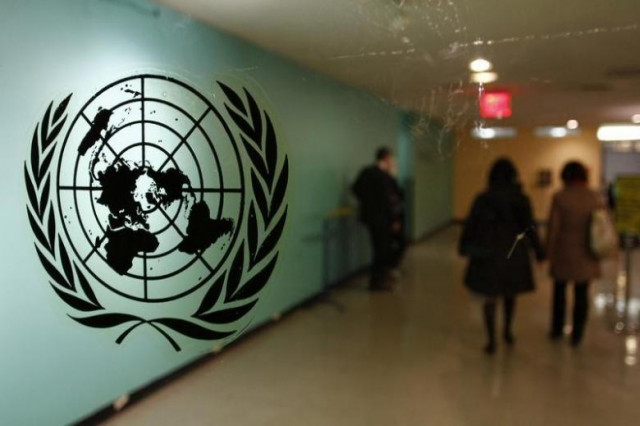UN urges Pakistan to gear up for periodic review
Experts urge government to expedite implementation of necessary laws

PHOTO: REUTERS/FILE
Being a responsible member of International community, the government must fulfil its international obligations under the Universal Periodic Review (UPR), said UNHCR legal adviser for South Asia Reema Omer. She was speaking at a briefing session during which she delivered a presentation on the mechanism and importance of UPR and child rights.
NA panel approves child protection, juvenile justice bills
Activists, social activists and media professionals attended the event organised at a local hotel on Friday. Activist Iftikhar Mubarik also spoke about Pakistan’s international obligations towards child rights.
Reema, meanwhile, discussed ways in which the government could, in a better way, expedite the implementation of recommendations to improve the situation of human rights in the country.
Reema Omer said that UPR was a mechanism under which the Human Rights Council examines the situation in every member state of the United Nations. “Each state is examined once every four years. The UPR is an inter-governmental process whereby the human rights records of a given country will be reviewed by other countries.”
She said that on October 30, 2012, the situation of human rights in Pakistan was reviewed for the second time after four years by member countries at the Human Rights Council in Geneva.

During the review, Pakistan was given a number of concrete recommendations for administrative, legislative and other measures to improve the overall situation of human rights, including children’s rights.
UN blacklists Saudi-led coalition for killing children in Yemen
Mubarik said that in 2012, Pakistan was urged to undertake measures, including establishment of independent monitoring mechanisms and enactment of efficient legislation.
The measures included prohibiting and preventing the employment of children as domestic workers, ratification of the Optional Protocol to UNCRC on the involvement of children in armed conflicts and expediting the adoption of the Charter of Child Rights Bill which had been pending for many years at the national level.
He said that the recommendations further asked Pakistan to strengthen measures aimed at providing protection and assistance to vulnerable segments of society, including those children affected by natural disasters to protect them from trafficking and exploitation at work. Mubarik added that it was also recommended to take steps to implement laws and policies with a view to eliminating early and forced marriage, to continue efforts for a systematic and sustained training process of child and developing the Child Protection Management Information System (CPMIS). It was also suggested to ensure and allocate sufficient resources for girls’ education in all provinces.
Another recommendation, said Mubarik, was to develop a comprehensive strategy to prevent sexual exploitation and cruel treatment of children. He appreciated the Pakistan’s ratification of CRC’s Optional Protocol on Involvement of Children in Armed Conflict and enactment of The Criminal Law (Second Amendment) Act 2016 and the recent passing of the National Commission on the Rights of Children Act 2017 by the upper and lower houses.
He urged the government to allocate all required financial and human resources to ensure effective implementation of enacted legislation.
Child Rights Movement and Children Advocacy Network (CAN) Pakistan Coordinator Rashida Qureshi said the government was yet to establish the Child Protection Information Management System.
Consequently, she said that there was no proper mechanism for the collection of children’s rights violation data.
Qureshi regretted that even after various incidents, including sexual abuse and exploitation in Kasur, being reported, the government of Punjab and even other provincial governments had not come up with Child Protection Policy or any plan of action or roadmap to prevent such incidents.
Published in The Express Tribune, October 7th, 2017.



















COMMENTS
Comments are moderated and generally will be posted if they are on-topic and not abusive.
For more information, please see our Comments FAQ